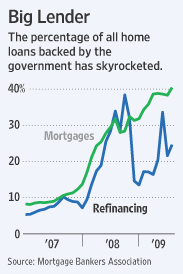Nick Timiraos and Deborah Solomon at the Wall Street Journal have an excellent report on problems at the FHA (Federal Housing Administration).
"They're probably going to need a bailout at some point because they're making loans in a riskier environment," says Edward Pinto, a mortgage-industry consultant and former chief credit officer at Fannie Mae. " . . . I've never seen an entity successfully outrun a situation like this." . . .
Before the boom, the FHA wasn't a big player in the housing business because it didn't follow private lenders in loosening its standards. Borrowers had to fully document incomes and insured loans were capped at $362,000. Congress increased those limits last year to as high as $729,750 in the most expensive markets. In August, the FHA and the U.S. Department of Veterans Affairs backed 40% of loans for all home sales. . . .
While most private lenders have raised lending standards and now require minimum 20% down payments, the share of borrowers who are able to make down payments of less than 10% hasn't changed in the last two years, largely because of the FHA, says Mr. Pinto . . . .

Marketwatch summarizes the problem:
The government seems to have taken over Countrywide's business model, and it's not working out much better the second time around.
The Federal Housing Administration may be next in line for a government bailout because it's losing a lot of money on bad mortgages, according to a report in the Wall Street Journal.
When the subprime mortgage industry self-immolated a couple years ago, the staid FHA was ordered into the breach to try to stabilize a market in freefall. As the bubble expanded earlier in the decade, the FHA hadn't relaxed its lending standards, unlike its swashbuckling counterparts in the private sector.
But once the housing market started to collapse, the government decided the FHA should try to prop up the market. The FHA loosened its standards a bit, though not as far as the subprime sharks had. FHA guaranteed loans with a down payment as small as 3.5% and let borrowers take a lot of cash out of refinancings. Congress also doubled the maximum loan to $729,750 [in some areas].
The federal agency, which guarantees loans made by private companies, also briefly allowed sellers to finance down payments.
The result was predicable, at least to anyone who was paying attention to the way the housing bubble collapsed. The FHA increased its market share from 3% to about 23%, and more of its loans began to go sour.
The Congress, not just the FHA and the Veterans Administration, have been trying hard to reinflate what's left of the real estate bubble. This reminds me of the successful efforts of the Hoover and FDR administrations in the 1930s to prevent wages in manufacturing from dropping to their market-clearing level, actions that helped create and then lengthen the Great Depression. The quicker housing prices reach their market-clearing level, the sooner a strong housing recovery can start.
Related Posts (on one page):
- Could a Government Regulator of Systemic Risk Avoid the Next Economic Meltdown?--
- FHA Adopts Countrywide's Business Model and It's Not Working . . . Again.--
- Former GAO Head Warns of Impending Deficits.--